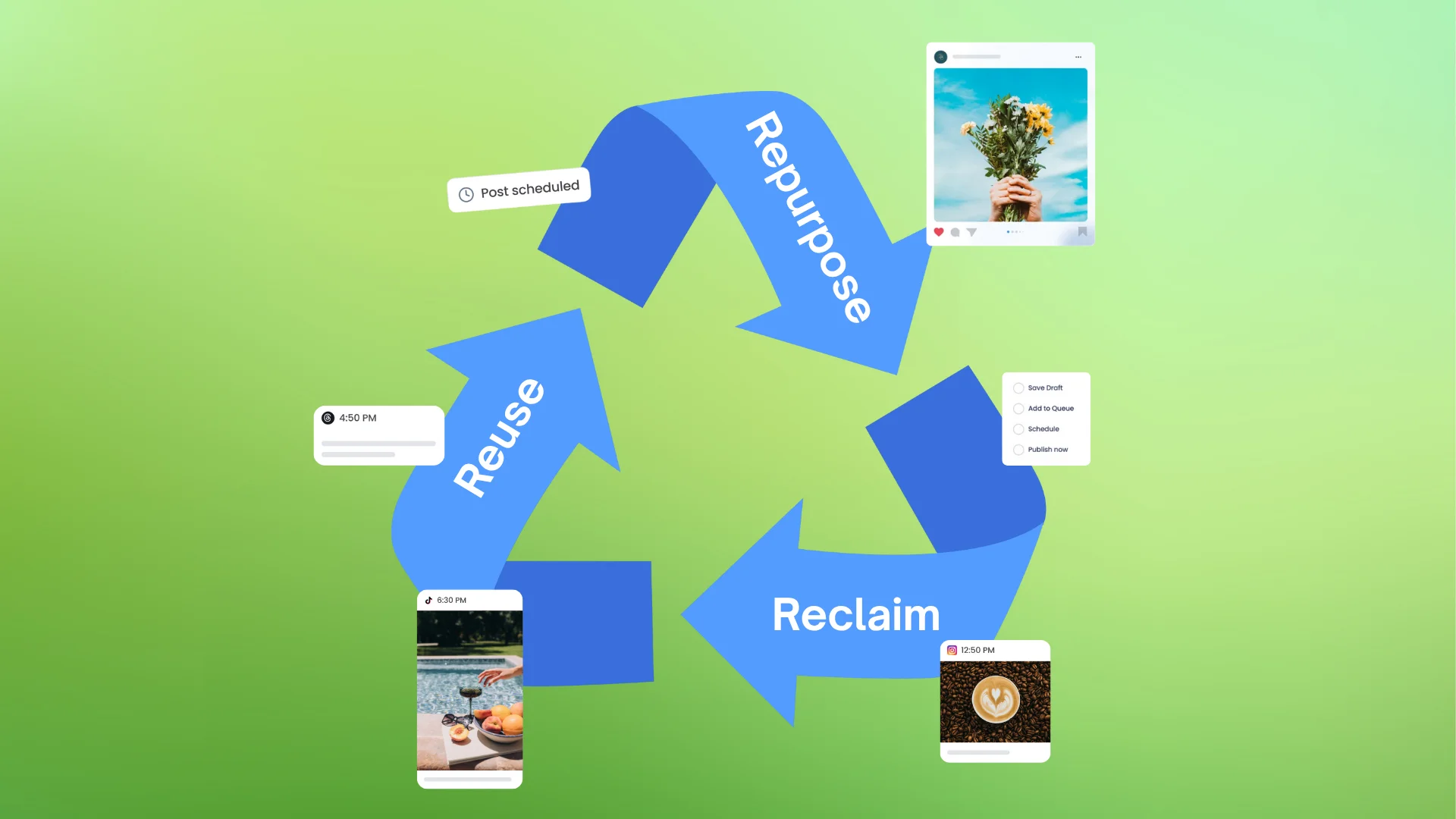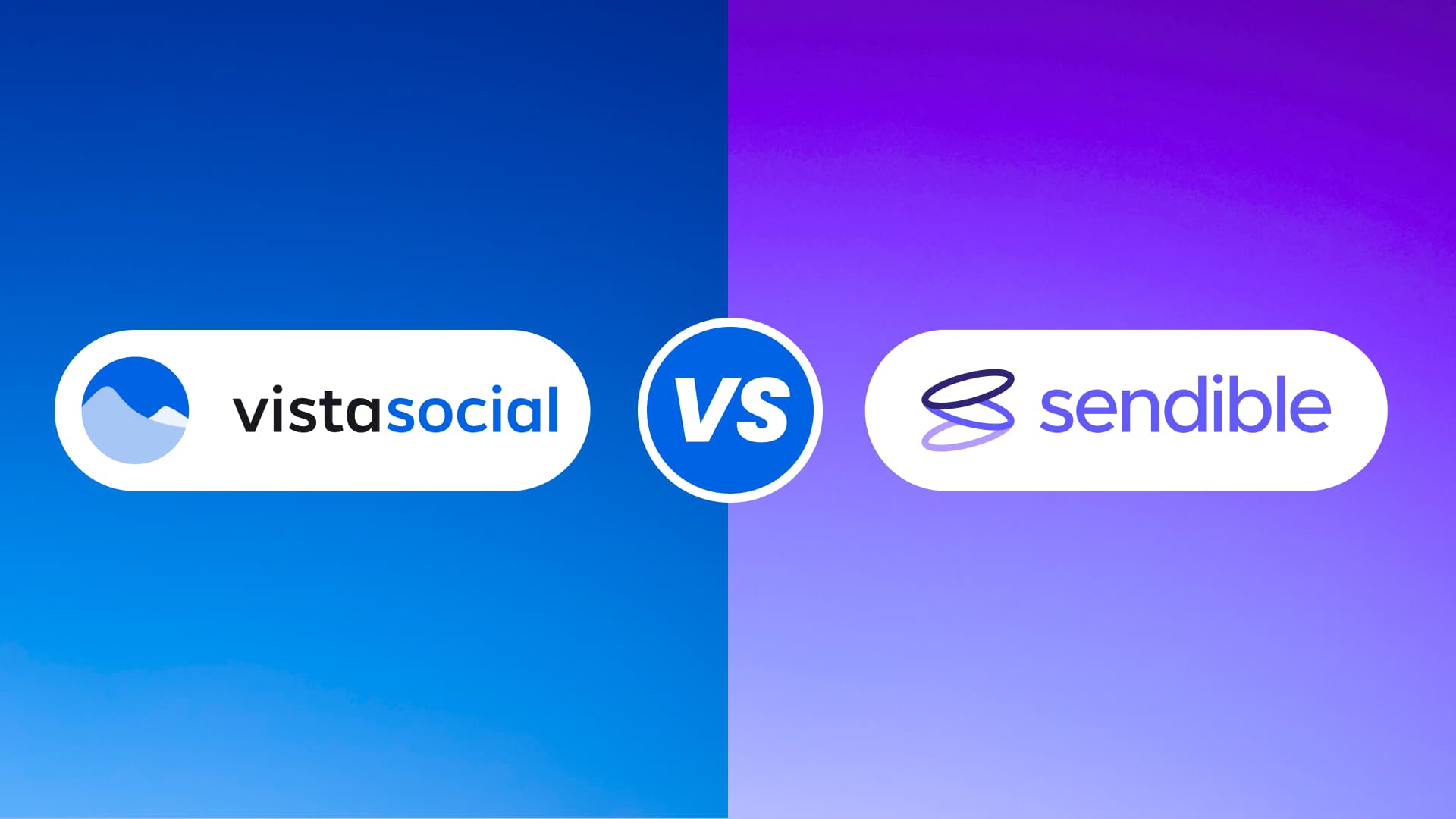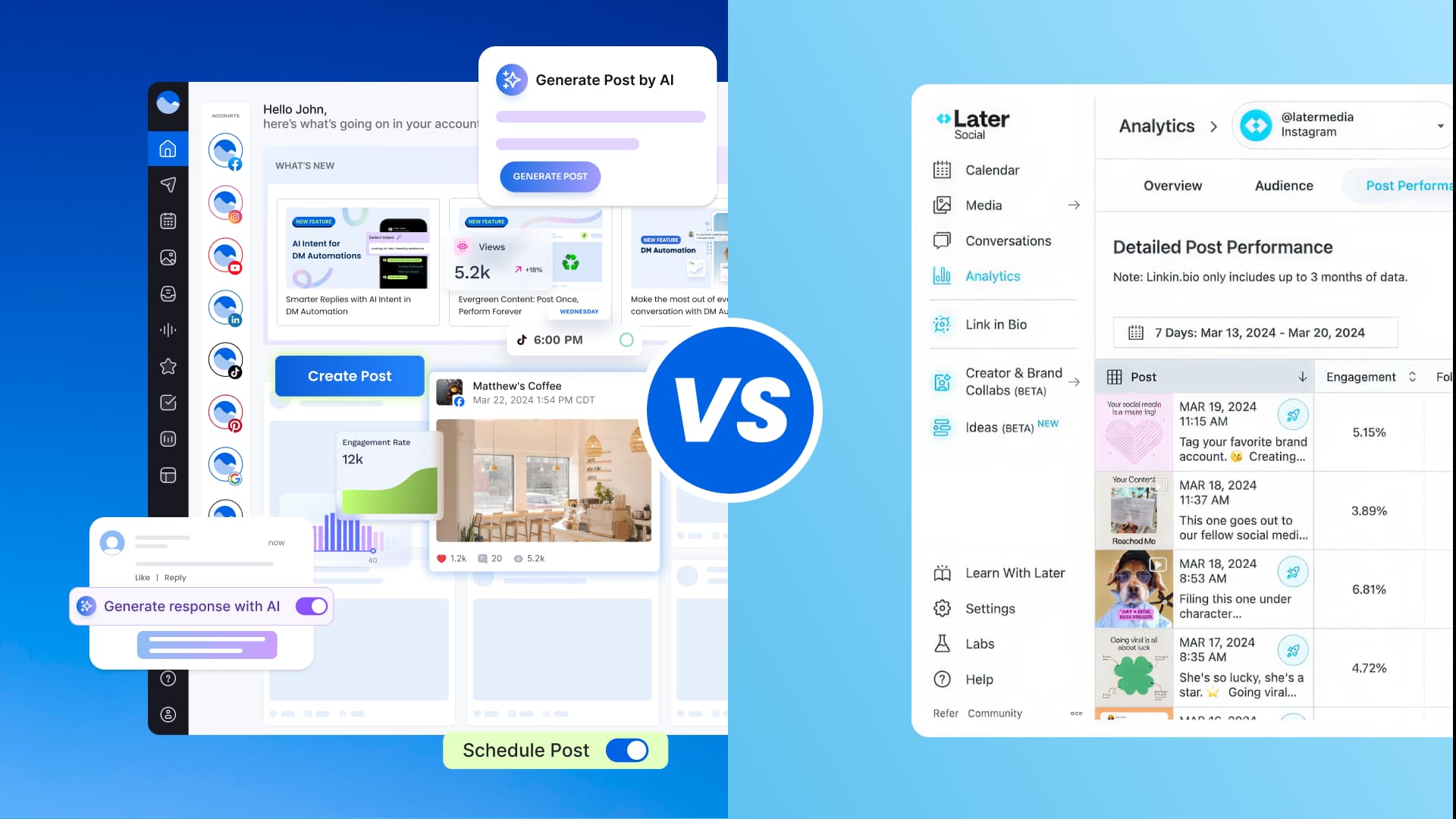New

Turn Your DMs Into Lead Gen!
Learn how to collect lead data from your DMs such as email addresses, phone numbers, and more right from your social inbox. If you are not yet automating your DMs your competitors are outpacing you.

How Something Social Saved 75% of Their Time and Increased Revenue by 15%
See how a fast-growing agency improved operations, cut down hours of manual work, and unlocked new revenue opportunities with Vista Social.
New

50 Unique Social Media Ideas for Consistent Content Creation
Discover 50 unique social media post ideas to engage your audience, grow your brand, and maintain a consistent content strategy with ease!

Mastering Content Reuse: The Key to a Consistent and Sustainable Posting Strategy
Published on January 23, 2025
9 min to read
The Ethics of Social Media Marketing: Navigate Transparency and Authenticity
Summarize with AI

Summarize with AI
ChatGPT
Claude
Perplexity
Share
Vista Social
X (Twitter)
Table of contents
Summarize with AI
ChatGPT
Claude
Perplexity
Share
Vista Social
X (Twitter)
Social media isn’t just about sharing photos anymore—it’s where people discover brands, connect with communities, and make purchasing decisions. With over 5.04 billion active social media users worldwide as of January 2024, the reach is undeniable. As social platforms continue to grow, the ethics of social media marketing have become more important than ever.
Consumers today expect brands to be transparent and authentic. A recent study found that 88% of consumers say authenticity is important when deciding which brands to support. Moreover, 94% of consumers are more likely to be loyal to a brand that’s completely transparent.
The demand for genuine content is at an all-time high. People want to connect with brands on a personal level, and inauthenticity can erode credibility, making it imperative for brands to maintain genuine engagement.
So, how can businesses ensure they’re marketing ethically while still driving engagement and growth? In this blog, we’ll explore strategies to help brands navigate the delicate balance between transparency and authenticity, fostering meaningful connections and achieving long-term success.
Table of contents
The Importance of Transparency in Social Media Marketing
Transparency in social media marketing means being open, honest, and upfront with your audience about your brand’s practices, values, and intentions. It’s a crucial component of the ethics of social media marketing, ensuring that brands build trust and foster meaningful relationships with their audience.
In the world of likes, shares, and viral trends, consumers are savvier than ever. They want to engage with brands they can trust—brands that openly share their values, partnerships, and intentions. As the demand for ethical and authentic engagement grows, businesses must embrace transparency as a core element of their social media strategy.
Why Transparency Matters Now More Than Ever
Today’s audiences are hyper-aware of marketing tactics. With 73% of consumers saying they’re willing to pay more for products from transparent brands, businesses that embrace honesty gain a competitive edge.
Transparency also strengthens relationships, helping brands stand out in an oversaturated market where authenticity is valued above all else.
However, transparency isn’t just about telling your audience what they want to hear—it’s about delivering on promises and ensuring consistency across all interactions.
Whether it’s clearly disclosing sponsored partnerships, accurately representing products, or respecting user data, brands must be intentional with their messaging.
How Brands Can Embrace Transparency Effectively
Achieving transparency in social media marketing requires a proactive approach. Here are a few ways brands can make it part of their strategy:
- Be upfront about sponsorships and partnerships. Transparency means making it clear when content is paid for or influenced by collaborations. This builds credibility and trust with your audience.
- Engage in honest communication. Avoid exaggerated claims and ensure that your content accurately reflects your product or service offerings.
- Stay compliant with data privacy laws. Regulations like GDPR and CCPA demand that brands be clear about how they collect, store, and use customer data.
Maintaining transparency can seem like a challenge, but having the right processes in place makes it easier. Social media management platforms, such as Vista Social, provide tools that help brands stay accountable—whether it’s through content approvals, performance tracking, or audience engagement monitoring.
Ultimately, transparency isn’t just an ethical requirement; it’s a strategic advantage. Brands that prioritize open communication and trust will foster stronger connections and long-term success in today’s social landscape.
[Must Read: Building a Community: Strategies for Fostering Brand Loyalty Online]
Authenticity: Building Real Connections with Audiences
Authenticity is more than just a buzzword. It’s about being real, relatable, and consistent at every touchpoint. Consumers today are overwhelmed with content. They’re looking for brands that feel human, honest, and trustworthy. That’s why authenticity plays a key role in the ethics of social media marketing.
Being authentic means showing up as you are. It’s about aligning your messaging with your brand values and engaging in meaningful conversations. Instead of just broadcasting promotions, brands need to focus on building genuine connections.
Why Storytelling and Personal Branding Matter
Authenticity thrives through storytelling. Whether it’s behind-the-scenes glimpses, customer success stories, or sharing your brand’s mission, storytelling helps create emotional connections that resonate with audiences.
Personal branding also plays a key role—when leaders and team members share their voices and experiences, it adds a layer of relatability and trust that goes beyond corporate messaging.
Brands that consistently weave storytelling into their content create an identity that feels personal, rather than promotional. It’s this approach that turns casual followers into loyal advocates.
Common Pitfalls of Inauthentic Marketing
While authenticity sounds simple, many brands fall into traps that can make them appear insincere, including:
- Overusing Stock Content: Generic visuals can make a brand feel disconnected and impersonal. Audiences respond better to original, behind-the-scenes content that showcases the real people behind the brand.
- Jumping on Trends That Don’t Align with Brand Values: Not every viral challenge or trending hashtag fits your brand. Forced participation can make your marketing feel disingenuous.
- Misleading Claims and Over-Promising: Transparency and authenticity go hand in hand. Making exaggerated claims about products or services can backfire and erode trust.
How Brands Can Foster Authenticity
Authenticity isn’t something you can fake—it’s built over time through consistent, meaningful engagement. Here are a few ways to cultivate it:
- Share real stories from your community. Feature user-generated content, testimonials, and team highlights to give your brand a human touch.
- Engage with your audience in real-time. Responding to comments and messages with genuine interest fosters relationships and shows customers you’re listening.
- Use data to guide your content. Understanding what resonates with your audience allows you to create content that feels personal and relevant, without straying from your brand’s voice.
Staying authentic can feel overwhelming in a fast-paced digital world, but social media management tools like Vista Social help brands stay consistent and intentional.
Whether it’s planning content that resonates or tracking audience engagement, the right tools make it easier to stay true to your brand voice without losing momentum.
Ethical Challenges in Social Media Marketing
Social media offers brands an incredible opportunity to connect with audiences, but it also comes with significant ethical responsibilities. In an era where consumers are more conscious of brand behavior than ever, ethical missteps can have lasting consequences.
That’s why understanding the ethics of social media marketing is crucial for businesses looking to build trust and credibility.
From misleading influencer campaigns to privacy concerns, businesses must take proactive steps to ensure their marketing strategies align with ethical standards. Prioritizing ethical practices helps brands foster genuine connections and long-term loyalty.
Navigating social media ethically isn’t always straightforward. Brands often encounter challenges that require careful consideration and strategic solutions, including:
Influencer Marketing Ethics and Disclosure Challenges
Influencers have become a powerful force in marketing, but transparency is key. Brands must ensure influencers disclose partnerships clearly to comply with regulations and maintain audience trust. Without proper disclosure, audiences may feel misled, damaging credibility.
Handling Customer Data Responsibly
Data is at the core of digital marketing, but with increased scrutiny on privacy, brands must be transparent about how they collect, store, and use customer information. Following regulations like GDPR and CCPA is crucial—not just for compliance, but to maintain customer confidence.
Combatting Misinformation and Fake Engagement
From misleading product claims to artificially inflated engagement metrics, misinformation can spread quickly on social media. Brands must take responsibility for fact-checking content, avoiding clickbait tactics, and fostering honest engagement with their audience.
How Brands Can Address These Challenges Effectively
Tackling ethical challenges requires a combination of clear policies, accountability, and the right tools to ensure transparency across all social media efforts. Some key ways to do this include:
- Establishing clear guidelines. Outline internal policies for influencer collaborations, data handling, and content creation to ensure ethical marketing practices across the board.
- Prioritizing transparency in reporting. Avoid vanity metrics and focus on sharing real, meaningful insights that reflect the actual impact of your campaigns.
- Engaging proactively with audiences. Whether it’s addressing concerns about data privacy or clarifying misleading claims, being responsive and open helps build long-term trust.
Maintaining ethical social media practices can be challenging, but leveraging the right tools can help simplify the process. Platforms like Vista Social provide businesses with tools to streamline social media management—helping brands stay consistent, engage authentically, and analyze their audience without compromising ethical standards.
Best Practices for Ethical Social Media Marketing
In a digital world where trust is everything, the ethics of social media marketing have never been more important. Brands that prioritize honesty, transparency, and integrity can build lasting relationships with their audience while staying compliant with evolving regulations.
But ethical marketing doesn’t happen by accident; it requires a strategic approach and ongoing commitment. To create an ethical social media presence, brands should focus on these key best practices:
Developing Ethical Guidelines for Social Media Teams
Establishing clear do’s and don’ts helps ensure consistency across all platforms. This includes setting standards for influencer collaborations, fact-checking content, and respecting audience privacy.
Auditing Social Media Content for Compliance and Authenticity
Periodic reviews can help identify gaps in transparency, ensure content aligns with regulatory requirements, and confirm that brand messaging remains authentic and relevant.
Encouraging Open Dialogue With Audiences
Responding to questions, addressing concerns, and engaging in meaningful conversations show that your brand values its community and is committed to honesty.
How Brands Can Implement These Strategies Effectively
Fostering ethical marketing practices requires the right approach and tools to stay on track. Brands can take the following steps to ensure ethical consistency:
- Centralize content planning and collaboration. Having a clear, organized workflow helps ensure that messaging stays aligned with brand values and compliance guidelines.
- Leverage insights to refine ethical strategies. Analyzing audience interactions and feedback can help brands create more authentic content that resonates while maintaining ethical boundaries.
- Provide ongoing training for social media teams. Equipping teams with the knowledge and resources they need to understand ethical marketing principles can prevent missteps and reinforce accountability.
With the right approach and support, businesses can stay transparent, authentic, and ethical—creating stronger connections and lasting trust with their audience.
[Must Read: 10 Snapchat Marketing Tips: How to Grow Your Following]
The Future of Ethical Social Media Marketing
The ethics of social media marketing are changing fast. New technologies and rising consumer expectations are shaping the way brands connect with their audiences.
Staying ahead means adapting to trends that focus on transparency, authenticity, and trust. Today, ethical marketing isn’t just a nice-to-have—it’s what people expect.
As social media continues to evolve, brands that embrace ethical practices will stand out. Those that don’t? They risk losing credibility and falling behind in an increasingly conscious digital world.
The future of social media marketing will see brands placing a stronger emphasis on ethical considerations through:
AI Transparency and Responsible Automation
As AI-driven content creation and automation tools become more prevalent, businesses must ensure that AI is used responsibly. This means being transparent about how AI influences content, avoiding misleading information, and maintaining a human touch in customer interactions.
Authenticity-Driven Algorithms
Social media platforms are increasingly prioritizing content that fosters genuine connections over clickbait or sensationalism. Brands will need to create meaningful, relatable content that aligns with their values and resonates with their audience authentically.
Sustainability and Corporate Social Responsibility (CSR)
Consumers are paying closer attention to a brand’s ethical impact on society and the environment. Companies will need to align their social media presence with broader CSR initiatives to showcase their commitment to ethical business practices.
How Brands Can Prepare for the Future
Staying ethical in an evolving digital landscape means proactively adapting to these changes. Brands can take meaningful steps to ensure their social media strategies align with the future of ethical marketing by:
- Embracing transparent communication practices. Regularly updating audiences on business practices, data usage policies, and sustainability efforts fosters trust and keeps brands accountable.
- Leveraging ethical marketing tools and strategies. Using insights and analytics to measure content effectiveness without relying on vanity metrics ensures honest reporting and continuous improvement.
- Encouraging consumer advocacy and feedback. Actively listening to consumer concerns and incorporating their feedback into social strategies helps brands align with ethical standards and stay connected with their audience.
As consumer advocacy continues to shape the landscape of ethical marketing, brands must stay flexible and responsive to shifting expectations.
Social media management platforms, like Vista Social, are evolving to provide solutions that support these efforts—helping businesses manage their presence responsibly and stay aligned with ethical standards in an ever-changing environment!
The Ethics of Social Media Marketing: Building a Future on Trust
Balancing transparency and authenticity isn’t just a best practice—it’s the foundation of trust in social media marketing. Consumers are becoming more selective about the brands they engage with, and businesses that prioritize ethical marketing will stand out in a crowded digital space.
By embracing the ethics of social media marketing, brands can foster real connections, strengthen their reputation, and build long-term loyalty. It’s not about perfection—it’s about showing up honestly and consistently.
With the right mindset and tools, brands can navigate the complexities of social media with confidence. Prioritizing ethical marketing today means creating meaningful, lasting relationships that benefit both the brand and its audience.
P.S. New to Vista Social? It’s your all-in-one solution for marketing agencies, freelancers, and social media managers. Packed with advanced tools, it helps enhance collaboration, simplify workflows, and take your social media marketing to the next level.
Want to elevate your strategy? Create your Vista Social account today and discover powerful features that can revolutionize the way you manage social media!

Try Vista Social for free
A social media management platform that actually helps you grow with easy-to-use content planning, scheduling, engagement and analytics tools.
Get Started NowAbout the Author
Content Writer
Russell Tan is a content marketing specialist with over 7 years of experience creating content across gaming, healthcare, outdoor hospitality, and travel—because sticking to just one industry would’ve been boring. Outside of her current role as marketing specialist for Vista Social, Russell is busy plotting epic action-fantasy worlds, chasing adrenaline rushes (skydiving is next, maybe?), or racking up way too many hours in her favorite games.
Read with AI
Save time reading this article using your favorite AI tool
Summarize with AI
Never Miss a Trend
Our newsletter is packed with the hottest posts and latest news in social media.

You have many things to do.
Let us help you with social media.
Use our free plan to build momentum for your social media presence.
Or skip ahead and try our paid plan to scale your social media efforts.
P.S. It will be a piece of cake 🍰 with Vista Social
Subscribe to our Newsletter!
To stay updated on the latest and greatest Social Media news. We promise not to spam you!
Enjoyed the Blog?
Hear More on Our Podcast!
Dive deeper into the conversation with industry insights & real stories.


